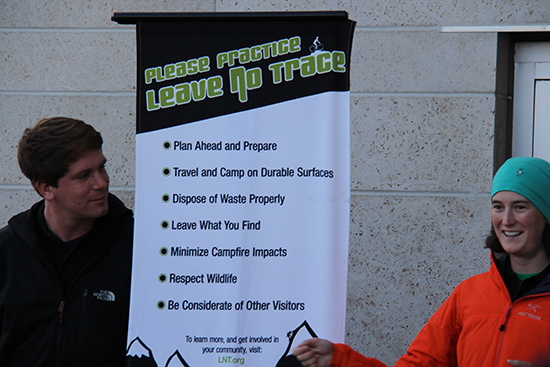Posted 10:06 p.m. Monday, Sept. 9, 2013

Outdoor ethic is becoming even more visible at UW-L as the university signed an educational partnership with a national organization dedicated to making a minimum environmental impact.
 Leave No Trace trainers explain the organization’s seven principles during a training spring semester. UW-La Crosse officially partnered with Leave No Trace at the end of spring semester.[/caption]
UW-La Crosse future outdoor recreation leaders have learned the importance of making a minimum impact on the environment for decades.
Now that outdoor ethic is becoming even more visible as the university signed an educational partnership with the national organization Leave No Trace. LNT is the most widely accepted outdoor ethics program used on public lands — adopted by federal agencies such as the U.S. National Park Service and The Bureau of Land Management.
The partnership means that UW-L will have a priority in bringing LNT trainers to the university for classes and weekend workshops at least once a year.
The partnership is also symbolic for UW-L, notes Steve Simpson, chair of the Department of Recreation Management and Therapeutic Recreation.
“Minimum impact is a big part of what we promote as educators of future outdoor recreation and Parks and Rec leaders,” he says.
[caption id="attachment_26183" align="alignleft" width="300"]
Leave No Trace trainers explain the organization’s seven principles during a training spring semester. UW-La Crosse officially partnered with Leave No Trace at the end of spring semester.[/caption]
UW-La Crosse future outdoor recreation leaders have learned the importance of making a minimum impact on the environment for decades.
Now that outdoor ethic is becoming even more visible as the university signed an educational partnership with the national organization Leave No Trace. LNT is the most widely accepted outdoor ethics program used on public lands — adopted by federal agencies such as the U.S. National Park Service and The Bureau of Land Management.
The partnership means that UW-L will have a priority in bringing LNT trainers to the university for classes and weekend workshops at least once a year.
The partnership is also symbolic for UW-L, notes Steve Simpson, chair of the Department of Recreation Management and Therapeutic Recreation.
“Minimum impact is a big part of what we promote as educators of future outdoor recreation and Parks and Rec leaders,” he says.
[caption id="attachment_26183" align="alignleft" width="300"] UW-La Crosse students in the Department of Recreation Management and Therapeutic Recreation play a game where they must pair up items that facilitate making a minimum impact during a Leave No Trace training last spring.[/caption]
Three UW-L groups collaborated to bring the LNT partnership to campus: UW-L’s Recreation Management and Therapeutic Recreation Department; Outdoor Connection, UW-L’s outdoor equipment rental service and UW-L’s Exercise and Sports Science Department.
“When your program is responsible for introducing outdoor activities and motivating people to recreate outdoors, you have a responsibility to teach them how to be good stewards of the resource,” says Nathan Barnhart, UW-L’s assistant director of Recreational Sports who also manages Outdoor Connection.”
Leave No Trace advocates seven primary principles. Ideas such as planning ahead for outdoor experiences helps recreationists make less impact. For instance, remembering to bring warm clothes or a portable cook stove will make building a campfire less necessary.
“We want to make sure there is space and opportunities for recreation available for people in the future,” says Laurie Harmon, assistant professor of Recreation Management and Therapeutic Recreation, who had the original idea to partner with LNT.
Harmon says faculty efforts to promote LNT are exponential because future leaders and professionals will take it with them and continue to educate.
“There are more and more people on this planet and we have to look more and more at our behaviors that make an impact,” she says. “There is a need for future advocates for the outdoors because it is so integral to our quality of life.”
LNT trainers will offer awareness workshops through UW-L’s Outdoor Connection and also LNT programming will be provided in the Outdoor Living Learning Community in Eagle Hall. Principles will be incorporated into trip preparation and trip leader training through the Outdoor Connection. Trainers will attend some outdoor recreation classes spring semester. A successful hands-on training with LNT educators on campus last spring helped solidify the idea to partner, adds Harmon.
UW-La Crosse students in the Department of Recreation Management and Therapeutic Recreation play a game where they must pair up items that facilitate making a minimum impact during a Leave No Trace training last spring.[/caption]
Three UW-L groups collaborated to bring the LNT partnership to campus: UW-L’s Recreation Management and Therapeutic Recreation Department; Outdoor Connection, UW-L’s outdoor equipment rental service and UW-L’s Exercise and Sports Science Department.
“When your program is responsible for introducing outdoor activities and motivating people to recreate outdoors, you have a responsibility to teach them how to be good stewards of the resource,” says Nathan Barnhart, UW-L’s assistant director of Recreational Sports who also manages Outdoor Connection.”
Leave No Trace advocates seven primary principles. Ideas such as planning ahead for outdoor experiences helps recreationists make less impact. For instance, remembering to bring warm clothes or a portable cook stove will make building a campfire less necessary.
“We want to make sure there is space and opportunities for recreation available for people in the future,” says Laurie Harmon, assistant professor of Recreation Management and Therapeutic Recreation, who had the original idea to partner with LNT.
Harmon says faculty efforts to promote LNT are exponential because future leaders and professionals will take it with them and continue to educate.
“There are more and more people on this planet and we have to look more and more at our behaviors that make an impact,” she says. “There is a need for future advocates for the outdoors because it is so integral to our quality of life.”
LNT trainers will offer awareness workshops through UW-L’s Outdoor Connection and also LNT programming will be provided in the Outdoor Living Learning Community in Eagle Hall. Principles will be incorporated into trip preparation and trip leader training through the Outdoor Connection. Trainers will attend some outdoor recreation classes spring semester. A successful hands-on training with LNT educators on campus last spring helped solidify the idea to partner, adds Harmon.
